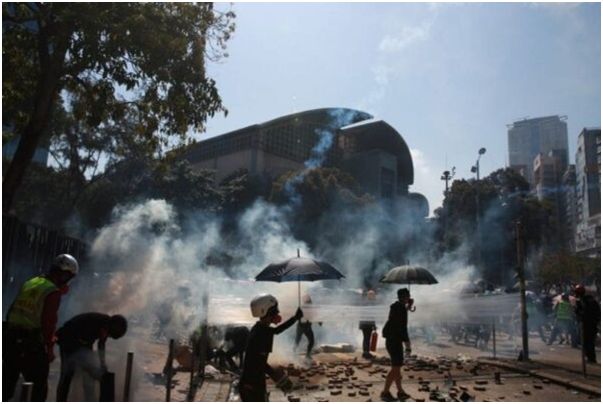Below we look at the events of July and August 1917 in Russia. Dates are given in the old style Julian calendar used in Russia at the time. This was 13 days earlier than the Gregorian calendar (adopted in Russia in 1918).
The economy is in crisis, with inflation out of control and workers thrown out of work in their thousands. The catastrophic world war grinds on. Capitalists and monarchists launch an all-out assault on the workers’ movement. Fake news and false allegations fill the right-wing press in an attempt to discredit the workers’ and socialist movement. They are echoed by right-wing socialist Mensheviks and the peasant-based Social Revolutionaries in the coalition government and in the leadership of the soviets.
July
2: The Kadets (Constitutional Democrats, the main capitalist party) withdraw from the Provisional Government adding to the political instability.
3-5: The July Days: an insurrectionary mood has been building among soldiers, sailors and workers in Petrograd at the failure to deliver bread, peace and land. They intend to stage an armed demonstration calling on the Petrograd Soviet to take power. Their demands, however, are in advance of the rest of Russia.
3: The Bolsheviks and Mezhraiontsy (the Inter-District Organisation led by Leon Trotsky and Anatoli Lunacharsky) meet at the Tauride Palace to discuss the fraught situation: whether to try to get the protest called off, or to lead it to minimise the potential long-term damage to the movement, and the casualties from the ensuing repression. In consultation with workers and soldiers, the latter course of action is agreed.
4: Half a million demonstrate in Petrograd. The government launches a brutal crackdown, with 400 casualties in the capital. The printing presses of the Bolshevik paper Pravda are destroyed, workers selling the paper are attacked by far-right thugs. The HQs of the Bolshevik Central Committee (CC) and Petrograd committee are raided.
5: The government orders the arrest of Bolshevik leaders and other activists.
7: Vladimir Lenin and Grigory Zinoviev go into hiding.
8: Prince Lvov resigns and a new interim government of the ‘salvation of the revolution’ is formed, headed by Alexander Kerensky.
12: Newspapers are shut down, freedom of assembly curtailed. The death penalty is reinstated for mutinous troops or deserters.
13: The government denounces Lenin and Zinoviev for evading arrest: if they are innocent, why did they run? The main aim is to undermine support for the Bolsheviks, and the propaganda is having an effect. In reality, the real risk of Lenin and co being killed while in custody meant that it was impossible for them to hand themselves in.
15: A Mezhraiontsy conference begins in Petrograd. Trotsky explains the urgent need to formally unite with the Bolshevik party.
18: General Lavr Kornilov becomes Russian army commander.
21: A decree is published indicting Lenin, Zinoviev and Alexandra Kollontai, among others, for state treason: working for foreign powers and organising an armed insurrection in Petrograd. The same laws are used to arrest Trotsky and Lunacharsky on 23 July.
24: Kerensky, now prime minister and war minister, forms a new coalition. This is ratified by the Petrograd Soviet executive by 147 votes to 46 with 42 abstentions – showing increased opposition to the Mensheviks and SRs.
26 July to 3 August: The 6th congress of the Bolshevik party takes place. It agrees to fuse with the Mezhraiontsy.
August
3: Joseph Stalin is elected to the Bolshevik CC.
7: Black Hundred (far-right, anti-Semitic) members are released from prison. Kornilov’s profile is built up in the press and at a Moscow conference of industrialists, bankers, generals, clergy and Kadet leaders. The Workers’ Section of the Petrograd Soviet demands the abolition of the death penalty, and sends greetings to Trotsky, Lunacharsky, Kollontai and others in Kresty prison. Putilov workers set aside a day’s wages for a workers’ press.
12-15: The Provisional Government organises the State Conference in Moscow, an attempt to bolster right-wing forces and side-line the soviets. Out of 2,500 delegates, nearly 500 are from the tsarist-era state Duma (parliament); more than 100 are army officers, with only around 300 from the soviets. It rules that party groupings can only speak with the presidium’s permission. The Bolsheviks boycott it. Moscow trade unions call a one-day strike, a decision backed by most of the district soviets. Although the Moscow Soviet votes against – by 364 to 304 – rank and file Mensheviks and SRs have already voted for the strike in their workplaces.
12: The strike is solid, with 400,000 out in Moscow, and similar action throughout Russia. The call for a one-day strike is well judged: it avoids a repeat of the July days, shows that Petrograd is not isolated, and that the Bolsheviks’ strength has been maintained.
14: At the conference, Kornilov declares his intention to rid Petrograd of revolutionaries.
19: The German army breaks through Russian lines, a fact used in the propaganda drive around Kornilov’s preparation for a coup.
20: The Bolsheviks, working under semi-clandestine conditions, make a breakthrough in elections to the Petrograd city duma. The SRs receive a little over 200,000 votes (37%) and 75 seats. The Bolsheviks come second on 33%, 65 seats. The Kadets have 42 seats, while the Mensheviks slump to eight (5%).
21: German troops occupy Riga, capital of Latvia.
26: A febrile atmosphere exists in Petrograd as fake news of a Bolshevik insurrection is whipped up by counter-revolutionary forces. Left-wing groups, trade unions, and shop and factory committees make it clear that no workers’ organisations or parties are calling any demonstrations.
27: Kornilov moves troops ever nearer to Petrograd, aided by British army personnel and vehicles. General Knox, head of Britain’s military in Russia, is clear: “This people needs the whip! A dictatorship, that is just what it needs”. British ambassador Sir George Buchanan offers the support of the allies.
27-30: Under the guidance of the Bolsheviks – even though they are in a minority – the Military Revolutionary Committee in Petrograd organises the defence of factories and workers’ districts. By the 29th, 40,000 Red Guards have been recruited. Rail workers rip up track or re-route Kornilov’s troop trains. Post/telegraph workers intercept military communications. The chauffers’ union provides transport, and printers take control of the press. Garrisons mutiny at Vyborg and Kronstadt. Kornilov is routed.
31: The Petrograd Soviet votes for the transfer of power to the working class by an overwhelming majority. The Mensheviks and SRs demand a second vote, pressuring delegates to overturn the decision. It is ratified again: by 279 votes to 115 with 51 abstentions.
The July days and August’s month of slander represented a colossal assault on the revolutionary movement. Yet, as the role of the right-wing press and coup plotters became clearer – and with the impotence, hypocrisy and betrayals of the Mensheviks and SRs increasingly exposed – the political authority of the Bolsheviks began to rise again, to new heights.


